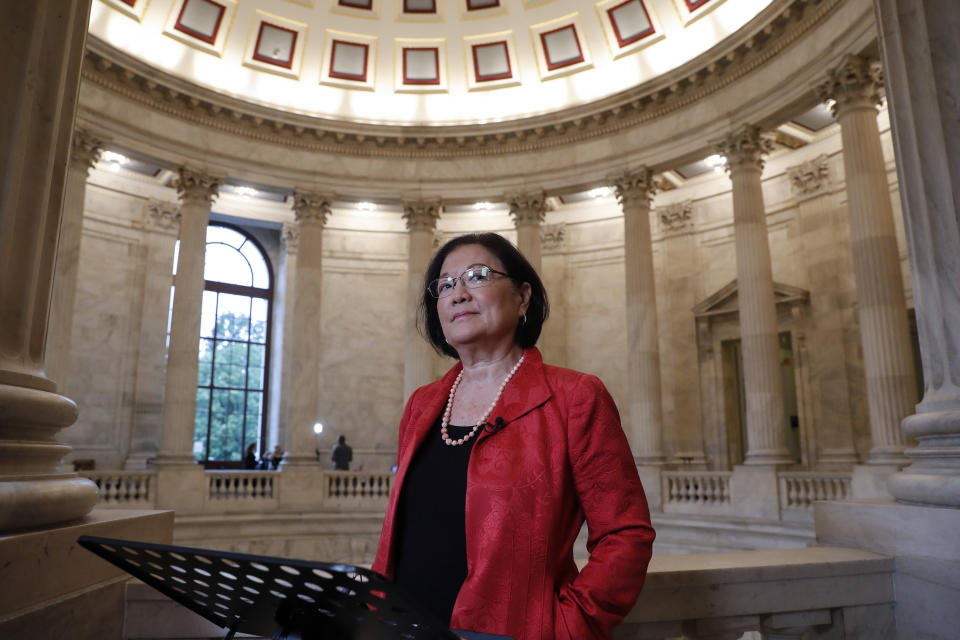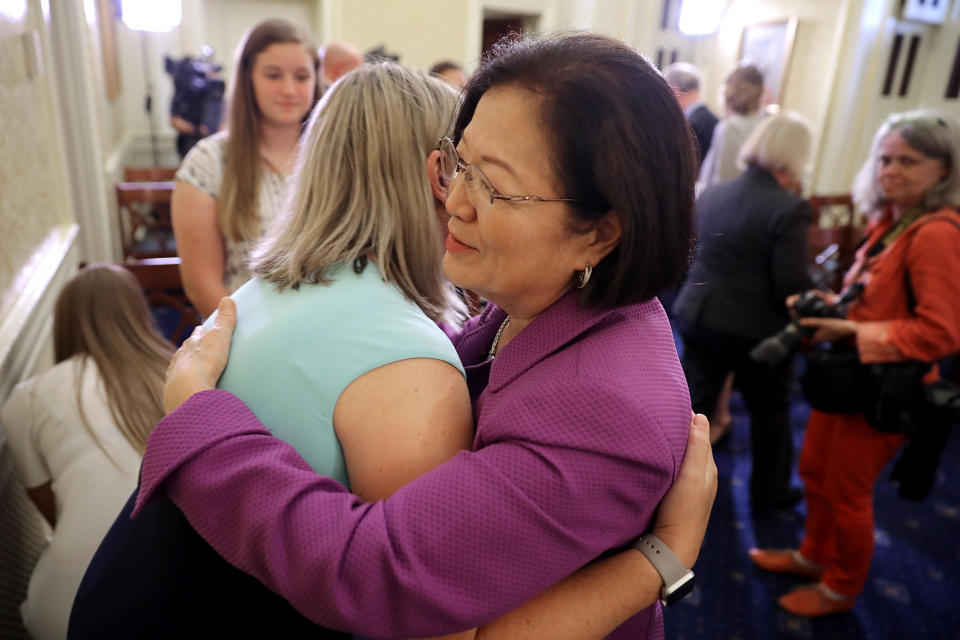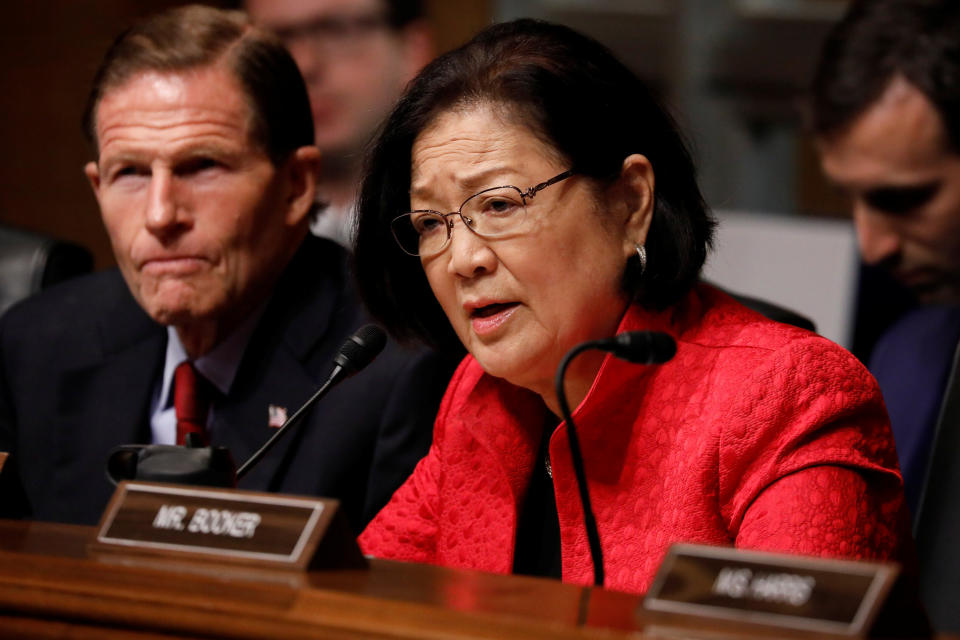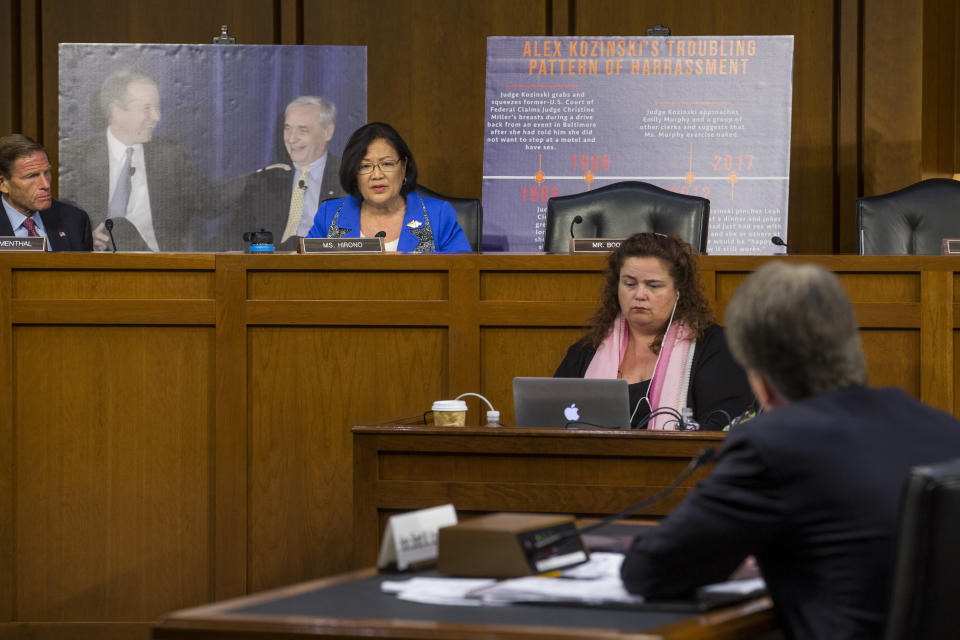How Sen. Mazie Hirono became Trump's toughest Democratic critic
Video Produced by Gaby Levesque
WASHINGTON — “This administration is so horrible that I think it’s important to speak out and fight back,” Sen. Mazie Hirono says, summing up how this seemingly placid 71-year-old from Hawaii has become a top nemesis of the Republican Party. During an hourlong conversation with Yahoo News in her Capitol Hill office — its walls painted a calming green and decorated with pottery and book-themed New Yorker covers—“horrible” was about the nicest word Hirono could muster for the current occupant in the White House.
Asked what, in particular, is horrible about the Trump administration, Hirono laughs. Only it is not a happy sound.
“Where do I start?” she says. “Let me count the ways.”
Unapologetic disdain for the president has made Hirono a hero to the left and, predictably enough, a villain to the right. Trump calls her a “crazy female senator.” The former chief of staff to Senate Majority Leader Mitch McConnell, R-Ky., is hardly more generous in his assessment: “Mazie Hirono is an embarrassment” was a recent tweet from Josh Holmes, which was “liked” more than 400 times. And some months ago, an apparently concerned citizen started a petition to remove Hirono from the U.S. Senate because she was a “disgrace to the people of Hawaii.”

That effort fell well short, and Hirono remains the junior senator from the Aloha State. As for the enmity she attracts from the right, it only confirms her status as one of Trump’s toughest critics on Capitol Hill, one who has largely forsaken shows of civility and bipartisanship in order to speak plainly about what dismays her.
Anger at Trump is not in short supply on the left; Hirono’s disdain, however, has found an audience like that of few others in Washington. “Senator Mazie Hirono is a true hero,” reads a Facebook post from Teen Vogue, a hub of anti-Trump resistance. Hirono’s newfound popularity may have to do with the fact that her anger feels neither calculated nor contrived. Apparently the only Democrat in Washington not running for president — but one who won reelection last year with 71 percent of the electorate — Hirono doesn’t have to curry favor with the base, or the middle, or anyone else.
“I’m not looking for all this attention,” she says, and something almost apologetic enters her voice. “But definitely, this administration has given a lot of opportunities to be so much more vocal.”
Though she has been in Washington since 2007 and was a fixture of Hawaii politics for many years before that, Hirono’s first 10 years on Capitol Hill — the first six of them in the House of Representatives — were decidedly quiet. The newspapers did not write about her. The cable news shows ignored her.
And then Trump came along.
Her first real chance to strike back at the new president came in July of 2017, as the Republicans appeared to be on the cusp of repealing President Obama’s signature achievement, the Affordable Care Act. Just two months before, Hirono had received a diagnosis of advanced renal cancer. Republican colleagues had showered her with good wishes. Now they were about to take health care away from millions of Americans who might otherwise be unable to afford treatment for ailments of their own.
On July 27, the Senate was debating a replace-and-repeal option known as “skinny repeal.” Hirono was going through treatment at the time, which would include the removal of a rib. “I was not slated to speak that night,” she remembered. But she was impelled to do so all the same. “Is there something I can say about how important health care is to all of us?” she remembers thinking.

It turns out there was. Hirono spoke informally, without the customary dais senators use in floor addresses. And she spoke with emotion, her voice seemingly on the point of breaking. “You showed me your care. You showed me your compassion,” she said to her Republican colleagues, some of whom had sent her get-well notes. “Where is that tonight? “I can’t believe that a single senator in this body has not faced an illness ― or whose family member or loved one has not faced illness ― where they were so grateful they had health care.”
The video quickly went viral. “Personal, moving speech from Mazie Hirono tonight about her cancer diagnosis,” tweeted Kyle Griffin, an MSNBC producer whose feed is a closely watched clearinghouse of anti-Trump news items. “This is worth your time.” The clip attached to his post garnered 846,000 views. Daily Kos, the progressive blog, called Hirono “heroic.”
The Republican efforts to repeal the Affordable Care Act failed, done in partly by a “no” vote by Sen. John McCain, R-Ariz., who was battling brain cancer at the time. As for her own cancer, Hirono says it is still there but has been contained. “I’m not going anywhere anytime soon,” she jokes.
Since her impassioned Senate address, she has emerged a plainspoken prosecutor of the case against Trump on every front conceivable. This was, she acknowledges, a challenge for a septuagenarian Japanese-American woman (one who is currently the only immigrant in the Senate).
“We’re not a terribly vocal culture,” she says, speaking of her upbringing in Japan and, later, Hawaii. At the same time, she remembered her own early activist days protesting the Vietnam War and saw, in that fight, a template for how to approach Trump. "I've always been very strong. I have a moral core.”
Even before she became vocal, Hirono indicated her opposition to Trump with her voting record. During the 115th Congress, which spanned his first two years in office, she voted with Trump only 25 percent of the time, making her among the most anti-Trump of U.S. Senators. Presidential candidate Amy Klobuchar, by contrast, voted with Trump at a rate of 32 percent, while former vice presidential candidate Tim Kaine did so 36 percent of the time.
Hirono has met Trump only once, at a White House meeting on immigration, but it was enough for her to take measure of the man. Suffice it to say that she was not impressed. “He cares about two things: protecting himself and money,” Hirono says, adding that she believes Trump to be a “malicious” person with “no empathy.”
Several weeks before we spoke, Hirono had been in the news for her confrontation with U.S. attorney general William Barr, who had come before the Senate Judiciary Committee to answer questions about the Mueller report. Hirono, who was assigned to the Senate Judiciary Committee shortly after winning her Senate seat in 2012, had no interest in questioning Barr.

Instead, she lectured him about how, in defending Trump from charges of obstruction of justice, he had abnegated his duty to the American people. “You lied to Congress,” she said, alluding to earlier testimony in which Barr appeared to mischaracterize aspects of the Mueller investigation.
Later, as Barr launched into the kind of legalistic explanation that had rescued him several times that day, Hirono sharply cut him off. “Give us some credit for knowing what the hell is going on around here,” she said.
The exchange infuriated Republican Sen. Lindsey Graham, the Trump loyalist who chairs the Senate Judiciary Committee. “You have slandered this man from top to bottom,” the irritable South Carolinian snarled.
Hirono remains unapologetic about her temperament during the Barr hearing, which only bolstered her standing with the party’s progressive base. “I think that we can use a hearing for those kinds of purposes,” she says. Sometimes, in her view, it is better to simply criticize a witness than question him, especially if questions aren’t likely to yield honest answers.
But she is a trained lawyer who knows how to cross-examine, as she demonstrated last fall in hearings for Brett Kavanaugh, whose nomination to the Supreme Court was imperiled in the summer of 2018 by allegations of sexual misconduct. Hirono was among the most vociferous supporters of his accuser, Northern California professor Christine Blasey Ford, who alleged that Kavanaugh tried to rape her when they were both in high school.
“I just want to say to the men of this country, just shut up and step up,” Hirono said at one point during the weekslong Kavanaugh battle. “Do the right thing for a change.” As if on cue, conservatives criticized Hirono for rhetorical excess, while progressives celebrated her willingness to speak truth to power.

She remains bitter about Kavanaugh. “He’s not a good lawyer,” she says, in seeming payback for Kavanaugh having crowed to her about attending top ranked Yale Law School (Hirono went to Georgetown Law, itself no backwater) during one tense exchange. And she certainly isn’t sorry about calling his integrity into question. “What she said was true,” Hirono says of Blasey Ford, who effectively went into hiding after being hounded by supporters of Kavanaugh and Trump following her testimony.
But viral moments aside, the Trump administration’s remaking of the federal judiciary continues apace, as Hirono well knows. Sen. Majority Leader Mitch McConnell, former Senate Judiciary Committee chairman Chuck Grassley and current chairman Graham have confirmed more than 100 judges to the federal bench, all with lifetime appointments.
Other challenges loom, too. Foremost among them is climate change, an issue she has avidly embraced. She points to Hawaii, once known as the nation’s most oil-dependent state. Now it is moving to a fully carbon-free future. She thinks the nation can do the same, and vigorously supports plans like the Green New Deal.
Of course, no progressive dream will be realized with Trump in office, which is why Hirono focuses on him, and his character, above all else. For her, and for many others, no policy goal is as great as the goal of removing Trump from office, whether by election or impeachment. “We have to speak up,” she says. “This is no time to be giving up."
_____
Read more from Yahoo News:
In quest for Gen Z votes, 2020 could be the year of the influencer
How Trump's embrace of a rogue Libyan warlord sparked a humanitarian catastrophe


